Unit 8 English Week 单元复习精讲精练课件
文档属性
| 名称 | Unit 8 English Week 单元复习精讲精练课件 |  | |
| 格式 | pptx | ||
| 文件大小 | 5.9MB | ||
| 资源类型 | 试卷 | ||
| 版本资源 | 牛津深圳版 | ||
| 科目 | 英语 | ||
| 更新时间 | 2023-11-28 15:44:57 | ||
图片预览

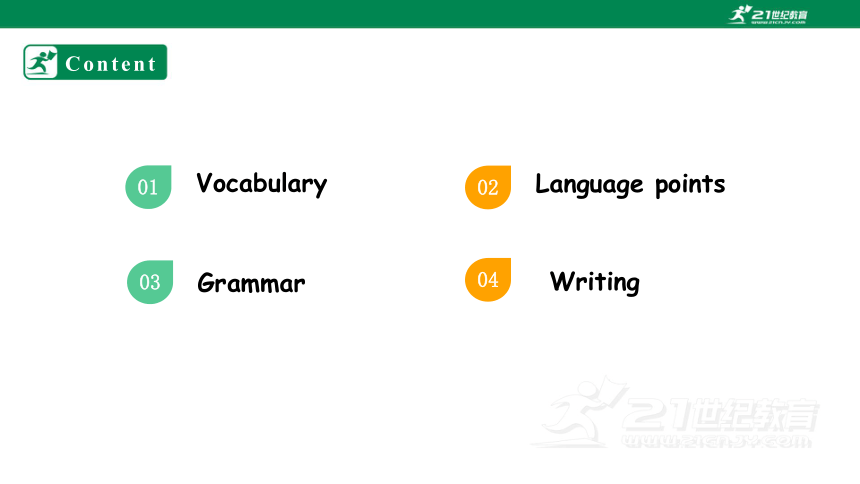

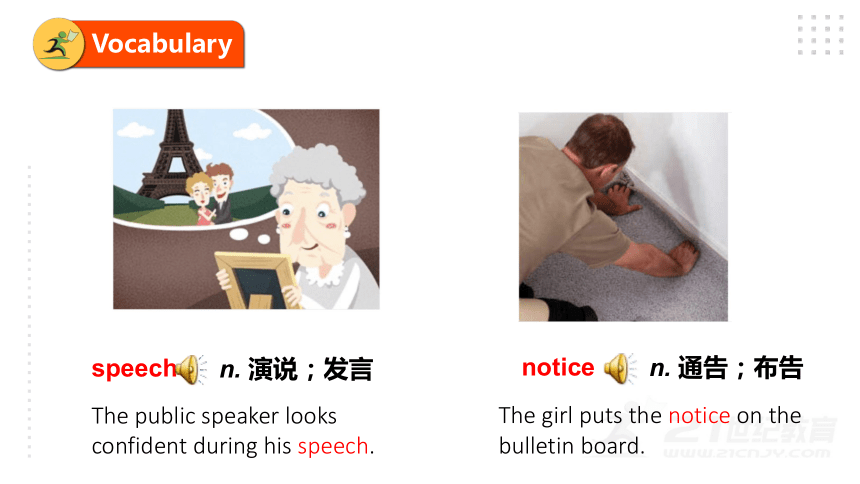
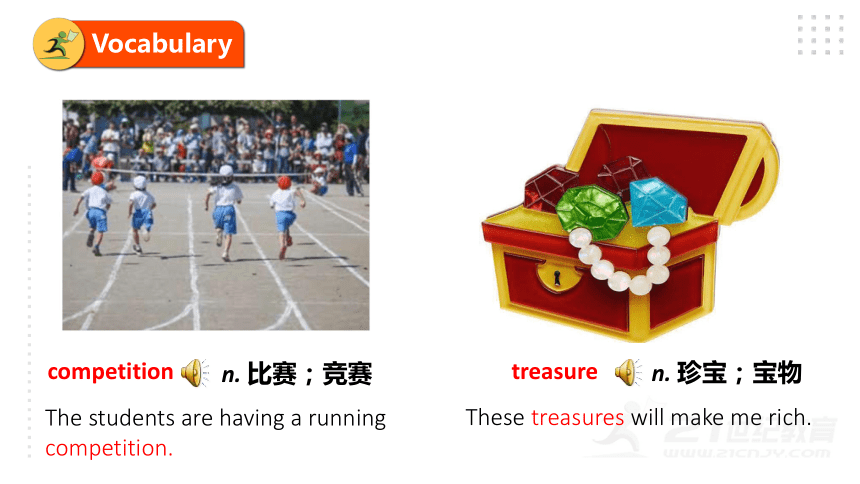
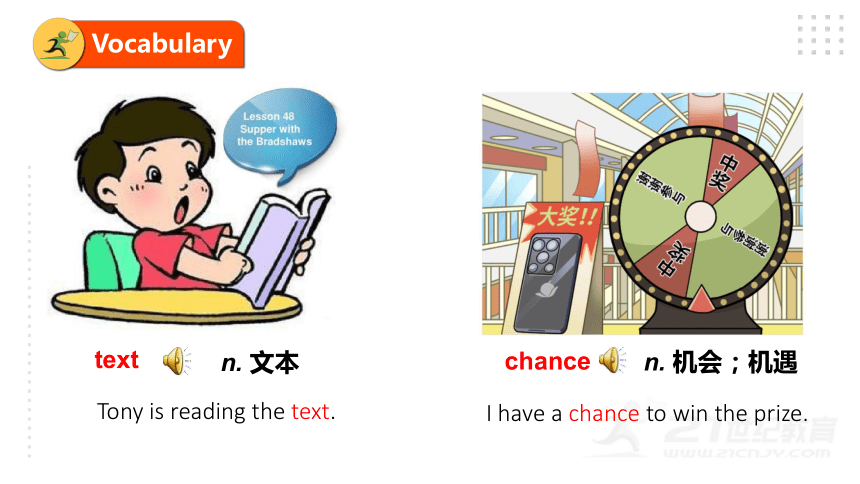





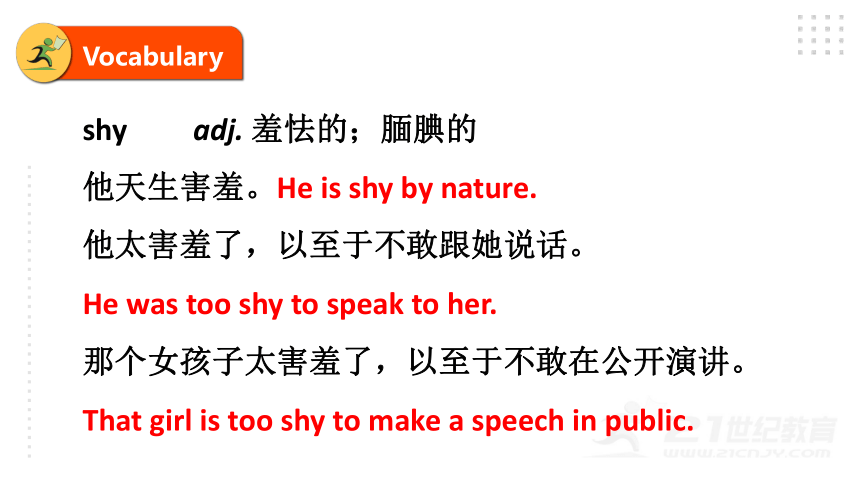
文档简介
(共65张PPT)
Unit 7 Memory
单元复习精讲精练课件
牛津深圳版(广州·沈阳通用)
七年级上
Content
Vocabulary
01
Language points
02
Grammar
03
04
Writing
Vocabulary
Vocabulary
n. 通告;布告
speech
notice
n. 演说;发言
The public speaker looks confident during his speech.
The girl puts the notice on the bulletin board.
Vocabulary
treasure
n. 珍宝;宝物
competition
n. 比赛;竞赛
These treasures will make me rich.
The students are having a running competition.
Vocabulary
Tony is reading the text.
I have a chance to win the prize.
text
n. 文本
chance
n. 机会;机遇
Vocabulary
confidently
adv. 自信地
n. 话题
topic
“I can defeat all the other players.” she said confidently.
Today’s topic Is on how to make money.
Vocabulary
winner
n. 优胜者
advise
v. 建议
I am the winner.
My doctor advised me to take a vacation.
Vocabulary
opinion
whole
n. 字母
adj. 整个的;全部的
The boy ate the whole watermelon by himself.
Different people have different opinions about the same thing.
Vocabulary
several
suggestion
det. 几个;一些
n. 建议;提议
I have several apples for you!
The doctor gave some health suggestions to the patient.
Vocabulary
communicate
whenever
v. 交流信息;沟通
conj. 在任何时候
With the Internet, I can communicate with my children whenever I want.
I am happy whenever I find treasure.
shy adj. 羞怯的;腼腆的
他天生害羞。He is shy by nature.
他太害羞了,以至于不敢跟她说话。
He was too shy to speak to her.
那个女孩子太害羞了,以至于不敢在公开演讲。
That girl is too shy to make a speech in public.
Vocabulary
1. rich adj. 富有的;富裕的
麦克是一个既富有又慷慨的人。
Mike is a rich and generous man.
然后,我准备举办艺术展览,因为我想名利双收。
Next, I’m going to hold art exhibitions because I want to be rich and famous.
Vocabulary
2. poor adj. 贫穷的;贫寒的
他太穷了,以至于没钱给孩子们买衣服。
She was too poor to buy clothes for her children.
我们应该尽力去帮助穷人。
We should try to help poor people.
3. hide v. 藏;隐藏
hide 的过去式是hid, 过去分词是hidden。
我把钱藏在床底下了。
I hid the money under the bed.
我的猫有时候藏在花园里。
My cat sometimes hides in the garden.
4. attack v. 袭击;攻击
军队攻打了那个城镇。
The army attacked the town.
罗宾汉袭击了约翰王子和他的朋友们。
Robin Hood attacked Prince John and his friends.
5. look out 小心;当心
当心!街上有很多车。
Look out! There are many cars in the street.
小心!危险!
Look out! It’s dangerous!
Language
points
【探索】
advise此处用作及物动词,意为“劝告;建议”。advise sb. to do sth. 意为“_________________”。
1. I advise people to speak slowly.
我建议大家放慢语速。
建议某人做某事
语言点
( )①The doctor advised me ________ eating junk food.
A. give up B. gave up
C. giving up D. to give up
②这位作家建议我们多读书。
The writer advised us ________ ________ more.
D
to read
对点专练
【观察】advise sb. not to do sth. 意为“_____________________”。
The doctor advised me not to smoke any more.
医生劝我不要再抽烟了。
建议某人不要做某事
拓 展
( )①We advised John ________ too many computer
games. He should spend more time on study.
A. play B. to play
C. not to play D. not playing
②我建议你不要喝太多可乐,这是不健康的。
I advise you ________ ________ ________ too much cola. It is unhealthy.
C
not to drink
能力提升
【探索】give sb. a chance to do sth. 意为“________________________”。
2. It gave me a chance to learn new words.
它给了我学习生词的机会。
给某人做某事的机会
语言点
( )①The teacher gave me a chance ________ a
speech in front of the whole class.
A. make B. made
C. making D. to make
②我希望你能给我一次解释的机会。
I hope you can ______ ________ ____ ________ to explain.
D
give me a chance
对点专练
【探索】suggestion用作可数名词,意为“________”。
3. He gave students some suggestions on how to improve their English.
他就如何提高英语水平给学生们提了一些建议。
建议
语言点
( )①—What a good ________ you’ve given
me! Thanks a lot.
—My pleasure.
A. information B. news
C. suggestion D. advice
②医生给了我一些关于健康生活的建议。
The doctor ______ ____ ______ ____________ on living a healthy life.
C
gave me some
suggestions
对点专练
【观察】advice是________(可数/不可数)名词,意为“建议”,其含义相当于suggestion。
I hope my advice is worth taking.
我希望我的建议值得采纳。
不可数
拓 展
( )—Can you give me some ________ on how
to achieve a balance between them
—Sure!
A. advice B. suggestion
C. feeling D. fact
A
能力提升
【探索】whenever是连词,意为“____________________”,相当于no matter when。
4. You should communicate in English with your friends whenever you can.
在任何时候你都应该尽可能地用英语与你的朋友交流。
无论何时/在任何时候
语言点
( )①Jason plays football ________ he is free. He likes
football very much.
A. whatever B. whenever
C. wherever D. however
②你想什么时候来看我们就什么时候来吧。
Come and see us ___________ you want.
B
whenever
对点专练
(1)We shall love you whatever happens, Diana.
戴安娜,不管发生什么,我们都爱你。
(2) Some people enjoy themselves wherever they are. 有些人能够随遇而安。
(3) However fast he runs, he can’t catch up with us. 无论他跑得多快也不能赶上我们。
拓 展
whatever = no matter what,意为“____________”。
wherever = no matter where,意为“____________”。
however = no matter how,意为“____________”。
无论什么
无论在哪里
不管怎样
Ⅰ. 语法巩固
( )1. Please call me ________ you need help. I am always ready to offer you help.
A. whatever B. whenever
C. wherever D. however
( )2. —Could you give me some ________ for my job interview
—Don’t be nervous and express yourself clearly.
A. ways B. questions C. suggestions D. messages
C
B
Practice
( )3. My mom advises me ________ to Hong Kong
during my summer holiday, because I don’t
know where to go.
A. go B. went C. going D. to go
( )4. The doctor did ________ he could to save the
man. And the man was out of danger finally.
A. whatever B. whenever
C. wherever D. however
D
A
( )5. This holiday gave me a chance ________ myself.
A. relax B. relaxed
C. relaxing D. to relax
D
Ⅱ. 完成句子
1. 我们劝祖父不要喝太多酒。因为这对他的健康有害。
We advised our grandfather _____ ______ ________
too much wine, because it is bad for his health.
2. 这次活动给了父母一个了解孩子的机会。
The activity ______ the parents ____ ________ ____
know their children.
not to drink
gave a chance to
【探索】belong to意为“________”,to是介词,后接名词或人称代词的宾格形式。
1. This castle and all your gold now belong to the poor! 现在,这城堡和你所有的黄金都属于穷人!
属于
Language Point
( )①—________ the watch ________to you
— No. It’s my brother’s.
A. Is; belong B. Does; belong
C. Is; belonging D. Does; belonging
②这所房子是王先生的。
The house _________ ________ Mr Wang.
B
belongs to
对点专练
( )1. Don't worry. Robin Hood will try ________ us.
A. to rescue B. rescue
C. to rescuing D. rescued
( )2. Thank you ________ me the truth. And I know what should I do now.
A. in telling B. to tell
C. for telling D. to telling
A
Practice
C
( )3.—Shall we meet at 9 o'clock tomorrow morning
—Sorry, let's make it ________ time.
A. others B. the others
C. another D. Other
( )4. Diaoyu Islands belong ________ China ever since ancient time.
A. to B. in C. under D. with
C
A
Practice
( )5. It's rather hot in the room. You'd better ________ the windows or the door.
A. close B. not to close
C. not close D. to close
C
Practice
Grammar
情态动词should的用法
1. should在肯定句中可用来讨论义务和职责或提出建议,意为“应该”。如:
You should pay more attention to spelling.
2. should后面跟不带to的动词不定式。否定式should not,其缩略形式是shouldn’t,意为“不应该 ”。如:
You should not / shouldn’t play football in the street.
Summary
3. should 用于疑问句,表示征求意见或请求指示。 如:
— Should I call the police
— Yes, you should. / No, you shouldn’t.
4. should 还可以表示更正别人的说法。
— The total price of these books is 230.5 yuan.
—No. That should be 232.5 yuan. Check it again.
注意:should和ought to均可用来谈论义务和职责或提出建议。两者 可以互换使用,不过should常用得多。
Summary
had better 用来表示竭力劝告,或告诉人们(包括自己)该做什 么事,意为“做……是好的;最好还是”。
had better之后要用不带to的动词不定式,即:had better do,
其缩略形式为 ’d better。
通常用“had better not + 不带to 的动词不定式”来表示否定。 如:
We’d better hurry or we will miss the train.
You’d better not go out late at night.
had better的用法
Summary
用于回答时,通常用简略式。如:
— Shall I wash my clothes right now
— You’d better. / You’d better not.
注意:
1. had better通常并不表示所提出的建议比其他选择更好——这里没有比较的意思。
2. had better用于谈论最近的将来,比should或ought to在时间上更为紧急。如:
There is only five minutes left. You had better hurry up.
只剩五分钟了。你还是快点吧。
Summary
How to make ourselves/ our good friends/ teachers / parents keep away from illnesses and be healthy
He/ She/They
should/had better
shouldn’t/had better not
eat/ drink…
play… (sports)
do … (living habits)
Smile at life. Be happy to be healthy.
Discussion
Ⅰ. 语法巩固
( )1. You should ________ the lab if your teacher doesn’t ask you to.
A. not enter B. not to enter
C. don’t enter D. not entering
A
能力提升
( )2. You ________ at home. To keep healthy, you ________ more outdoor activities.
A. should not stay; had better to take
B. had better not stay; should take
C. shouldn’t to stay; had not better take
D. had better not to stay; should taking
B
能力提升
( )3. You’d better not ________ too much pressure ________ your children.
A. to put; on B. to put; in
C. put; on D. put; in
( )4. You ________ run in the classroom. It’s easy to get hurt.
A. wouldn’t B. shouldn’t
C. may not D. needn’t
C
B
能力提升
( )5. It’s raining heavily outside. You had better ________ now, or you will get wet.
A. leave B. to leave
C. not leave D. not to leave
C
能力提升
Ⅱ. 根据要求完成句子
1. We should take good care of the young trees.(改为一般疑问句)
________ we ________ good care of the young trees
2. You ought to turn off the lights when you leave the room.(改为一般疑问句)
________ I ________ ________ off the lights when I leave the room
Should take
Ought to turn
能力提升
3. You ought to put your bike under the tree.
(改为否定句)
You ________ ________ ________ ________ your bike under the tree.
4. Everyone should follow the traffic rules. (改为一般疑问句)
________ everyone ________ the traffic rules
5. We had better go skiing next winter holiday. (改为否定句)
We ________ ________ ________ go skiing next winter holiday.
ought not to put
had better not
Should follow
能力提升
Writing
话题写作思维导图
拓 展
假如你是李华,你们学校每个月的第四个星期五都会举办English Day的活动,请你根据以下内容提示写一篇英语短文,向你班新来的交换生John介绍活动的情况并表达你的收获和感受。
对点专练
注意:
1. 词数:80词左右(短文的开头已给出,不计入词数);
2. 不得透露学校、姓名等任何信息,否则不予评分。
地点 活动内容
英语角 字谜、绕口令(tongue twister)等
学校礼堂 一个话题多样的英语演讲比赛
操场边 英语话剧表演、英语歌唱比赛
优胜者:获得学校的奖品 你的收获和感受:?(请你补充) English Day
具体介绍活动的地点和内容
表达你的收获和感受
English Corner, topics, ________
confident, worth, _______________
写作指导
第一步:审题 人称:___________________
时态:__________________
第二步:列提纲
第一段
第二段
具体介绍活动的地点和内容。We have…; There is…; Students can…
表达你的收获和感受。It can make…; It's worth…
第一人称、第三人称
一般现在时
写作指导
第三步:遣词造句
1. give sb. a chance to do sth. 意为“给某人一个机会做某事”。
【例句】它给了我一个学习生词的机会。It gave me a chance to learn new words.
【仿写】“英语日”给了我们展示自己的机会。________________________________________________
English Day gives us a chance to show ourselves.
2. be worth doing sth. 意为“值得做某事”。
【例句】英语周很值得开展。
English Week is well worth doing.
【仿写】“英语日”值得每个月举办。___________________________________________________
第四步:运用firstly, such as, besides, so that, because, above all等连接词连接句子,并注意句型多样化。
It's worth holding an English Day every month.
There is an English Day in our school on the fourth Friday every month. During the day, we have many interesting activities.
_______________________________________________________________________________________________________________________________________________________________________________________________________________________________________________________________________________________________________________________________________________________
At English Corner, we have many kinds of games, such as word puzzles and tongue twisters. In the school hall, there is an English speaking competition on different topics. Beside the playground, students can put on an English play or take part in an English singing competition. All the winners can get a nice prize from the school.
范 文
________________________________________________________________________________________________________________________________________________________________________________________
English Day gives us a chance to show ourselves. Above all, it can make us confident. Many students enjoy it. It’s worth holding every month.
谢谢
21世纪教育网(www.21cnjy.com)
中小学教育资源网站
兼职招聘:
https://www.21cnjy.com/recruitment/home/admin
Unit 7 Memory
单元复习精讲精练课件
牛津深圳版(广州·沈阳通用)
七年级上
Content
Vocabulary
01
Language points
02
Grammar
03
04
Writing
Vocabulary
Vocabulary
n. 通告;布告
speech
notice
n. 演说;发言
The public speaker looks confident during his speech.
The girl puts the notice on the bulletin board.
Vocabulary
treasure
n. 珍宝;宝物
competition
n. 比赛;竞赛
These treasures will make me rich.
The students are having a running competition.
Vocabulary
Tony is reading the text.
I have a chance to win the prize.
text
n. 文本
chance
n. 机会;机遇
Vocabulary
confidently
adv. 自信地
n. 话题
topic
“I can defeat all the other players.” she said confidently.
Today’s topic Is on how to make money.
Vocabulary
winner
n. 优胜者
advise
v. 建议
I am the winner.
My doctor advised me to take a vacation.
Vocabulary
opinion
whole
n. 字母
adj. 整个的;全部的
The boy ate the whole watermelon by himself.
Different people have different opinions about the same thing.
Vocabulary
several
suggestion
det. 几个;一些
n. 建议;提议
I have several apples for you!
The doctor gave some health suggestions to the patient.
Vocabulary
communicate
whenever
v. 交流信息;沟通
conj. 在任何时候
With the Internet, I can communicate with my children whenever I want.
I am happy whenever I find treasure.
shy adj. 羞怯的;腼腆的
他天生害羞。He is shy by nature.
他太害羞了,以至于不敢跟她说话。
He was too shy to speak to her.
那个女孩子太害羞了,以至于不敢在公开演讲。
That girl is too shy to make a speech in public.
Vocabulary
1. rich adj. 富有的;富裕的
麦克是一个既富有又慷慨的人。
Mike is a rich and generous man.
然后,我准备举办艺术展览,因为我想名利双收。
Next, I’m going to hold art exhibitions because I want to be rich and famous.
Vocabulary
2. poor adj. 贫穷的;贫寒的
他太穷了,以至于没钱给孩子们买衣服。
She was too poor to buy clothes for her children.
我们应该尽力去帮助穷人。
We should try to help poor people.
3. hide v. 藏;隐藏
hide 的过去式是hid, 过去分词是hidden。
我把钱藏在床底下了。
I hid the money under the bed.
我的猫有时候藏在花园里。
My cat sometimes hides in the garden.
4. attack v. 袭击;攻击
军队攻打了那个城镇。
The army attacked the town.
罗宾汉袭击了约翰王子和他的朋友们。
Robin Hood attacked Prince John and his friends.
5. look out 小心;当心
当心!街上有很多车。
Look out! There are many cars in the street.
小心!危险!
Look out! It’s dangerous!
Language
points
【探索】
advise此处用作及物动词,意为“劝告;建议”。advise sb. to do sth. 意为“_________________”。
1. I advise people to speak slowly.
我建议大家放慢语速。
建议某人做某事
语言点
( )①The doctor advised me ________ eating junk food.
A. give up B. gave up
C. giving up D. to give up
②这位作家建议我们多读书。
The writer advised us ________ ________ more.
D
to read
对点专练
【观察】advise sb. not to do sth. 意为“_____________________”。
The doctor advised me not to smoke any more.
医生劝我不要再抽烟了。
建议某人不要做某事
拓 展
( )①We advised John ________ too many computer
games. He should spend more time on study.
A. play B. to play
C. not to play D. not playing
②我建议你不要喝太多可乐,这是不健康的。
I advise you ________ ________ ________ too much cola. It is unhealthy.
C
not to drink
能力提升
【探索】give sb. a chance to do sth. 意为“________________________”。
2. It gave me a chance to learn new words.
它给了我学习生词的机会。
给某人做某事的机会
语言点
( )①The teacher gave me a chance ________ a
speech in front of the whole class.
A. make B. made
C. making D. to make
②我希望你能给我一次解释的机会。
I hope you can ______ ________ ____ ________ to explain.
D
give me a chance
对点专练
【探索】suggestion用作可数名词,意为“________”。
3. He gave students some suggestions on how to improve their English.
他就如何提高英语水平给学生们提了一些建议。
建议
语言点
( )①—What a good ________ you’ve given
me! Thanks a lot.
—My pleasure.
A. information B. news
C. suggestion D. advice
②医生给了我一些关于健康生活的建议。
The doctor ______ ____ ______ ____________ on living a healthy life.
C
gave me some
suggestions
对点专练
【观察】advice是________(可数/不可数)名词,意为“建议”,其含义相当于suggestion。
I hope my advice is worth taking.
我希望我的建议值得采纳。
不可数
拓 展
( )—Can you give me some ________ on how
to achieve a balance between them
—Sure!
A. advice B. suggestion
C. feeling D. fact
A
能力提升
【探索】whenever是连词,意为“____________________”,相当于no matter when。
4. You should communicate in English with your friends whenever you can.
在任何时候你都应该尽可能地用英语与你的朋友交流。
无论何时/在任何时候
语言点
( )①Jason plays football ________ he is free. He likes
football very much.
A. whatever B. whenever
C. wherever D. however
②你想什么时候来看我们就什么时候来吧。
Come and see us ___________ you want.
B
whenever
对点专练
(1)We shall love you whatever happens, Diana.
戴安娜,不管发生什么,我们都爱你。
(2) Some people enjoy themselves wherever they are. 有些人能够随遇而安。
(3) However fast he runs, he can’t catch up with us. 无论他跑得多快也不能赶上我们。
拓 展
whatever = no matter what,意为“____________”。
wherever = no matter where,意为“____________”。
however = no matter how,意为“____________”。
无论什么
无论在哪里
不管怎样
Ⅰ. 语法巩固
( )1. Please call me ________ you need help. I am always ready to offer you help.
A. whatever B. whenever
C. wherever D. however
( )2. —Could you give me some ________ for my job interview
—Don’t be nervous and express yourself clearly.
A. ways B. questions C. suggestions D. messages
C
B
Practice
( )3. My mom advises me ________ to Hong Kong
during my summer holiday, because I don’t
know where to go.
A. go B. went C. going D. to go
( )4. The doctor did ________ he could to save the
man. And the man was out of danger finally.
A. whatever B. whenever
C. wherever D. however
D
A
( )5. This holiday gave me a chance ________ myself.
A. relax B. relaxed
C. relaxing D. to relax
D
Ⅱ. 完成句子
1. 我们劝祖父不要喝太多酒。因为这对他的健康有害。
We advised our grandfather _____ ______ ________
too much wine, because it is bad for his health.
2. 这次活动给了父母一个了解孩子的机会。
The activity ______ the parents ____ ________ ____
know their children.
not to drink
gave a chance to
【探索】belong to意为“________”,to是介词,后接名词或人称代词的宾格形式。
1. This castle and all your gold now belong to the poor! 现在,这城堡和你所有的黄金都属于穷人!
属于
Language Point
( )①—________ the watch ________to you
— No. It’s my brother’s.
A. Is; belong B. Does; belong
C. Is; belonging D. Does; belonging
②这所房子是王先生的。
The house _________ ________ Mr Wang.
B
belongs to
对点专练
( )1. Don't worry. Robin Hood will try ________ us.
A. to rescue B. rescue
C. to rescuing D. rescued
( )2. Thank you ________ me the truth. And I know what should I do now.
A. in telling B. to tell
C. for telling D. to telling
A
Practice
C
( )3.—Shall we meet at 9 o'clock tomorrow morning
—Sorry, let's make it ________ time.
A. others B. the others
C. another D. Other
( )4. Diaoyu Islands belong ________ China ever since ancient time.
A. to B. in C. under D. with
C
A
Practice
( )5. It's rather hot in the room. You'd better ________ the windows or the door.
A. close B. not to close
C. not close D. to close
C
Practice
Grammar
情态动词should的用法
1. should在肯定句中可用来讨论义务和职责或提出建议,意为“应该”。如:
You should pay more attention to spelling.
2. should后面跟不带to的动词不定式。否定式should not,其缩略形式是shouldn’t,意为“不应该 ”。如:
You should not / shouldn’t play football in the street.
Summary
3. should 用于疑问句,表示征求意见或请求指示。 如:
— Should I call the police
— Yes, you should. / No, you shouldn’t.
4. should 还可以表示更正别人的说法。
— The total price of these books is 230.5 yuan.
—No. That should be 232.5 yuan. Check it again.
注意:should和ought to均可用来谈论义务和职责或提出建议。两者 可以互换使用,不过should常用得多。
Summary
had better 用来表示竭力劝告,或告诉人们(包括自己)该做什 么事,意为“做……是好的;最好还是”。
had better之后要用不带to的动词不定式,即:had better do,
其缩略形式为 ’d better。
通常用“had better not + 不带to 的动词不定式”来表示否定。 如:
We’d better hurry or we will miss the train.
You’d better not go out late at night.
had better的用法
Summary
用于回答时,通常用简略式。如:
— Shall I wash my clothes right now
— You’d better. / You’d better not.
注意:
1. had better通常并不表示所提出的建议比其他选择更好——这里没有比较的意思。
2. had better用于谈论最近的将来,比should或ought to在时间上更为紧急。如:
There is only five minutes left. You had better hurry up.
只剩五分钟了。你还是快点吧。
Summary
How to make ourselves/ our good friends/ teachers / parents keep away from illnesses and be healthy
He/ She/They
should/had better
shouldn’t/had better not
eat/ drink…
play… (sports)
do … (living habits)
Smile at life. Be happy to be healthy.
Discussion
Ⅰ. 语法巩固
( )1. You should ________ the lab if your teacher doesn’t ask you to.
A. not enter B. not to enter
C. don’t enter D. not entering
A
能力提升
( )2. You ________ at home. To keep healthy, you ________ more outdoor activities.
A. should not stay; had better to take
B. had better not stay; should take
C. shouldn’t to stay; had not better take
D. had better not to stay; should taking
B
能力提升
( )3. You’d better not ________ too much pressure ________ your children.
A. to put; on B. to put; in
C. put; on D. put; in
( )4. You ________ run in the classroom. It’s easy to get hurt.
A. wouldn’t B. shouldn’t
C. may not D. needn’t
C
B
能力提升
( )5. It’s raining heavily outside. You had better ________ now, or you will get wet.
A. leave B. to leave
C. not leave D. not to leave
C
能力提升
Ⅱ. 根据要求完成句子
1. We should take good care of the young trees.(改为一般疑问句)
________ we ________ good care of the young trees
2. You ought to turn off the lights when you leave the room.(改为一般疑问句)
________ I ________ ________ off the lights when I leave the room
Should take
Ought to turn
能力提升
3. You ought to put your bike under the tree.
(改为否定句)
You ________ ________ ________ ________ your bike under the tree.
4. Everyone should follow the traffic rules. (改为一般疑问句)
________ everyone ________ the traffic rules
5. We had better go skiing next winter holiday. (改为否定句)
We ________ ________ ________ go skiing next winter holiday.
ought not to put
had better not
Should follow
能力提升
Writing
话题写作思维导图
拓 展
假如你是李华,你们学校每个月的第四个星期五都会举办English Day的活动,请你根据以下内容提示写一篇英语短文,向你班新来的交换生John介绍活动的情况并表达你的收获和感受。
对点专练
注意:
1. 词数:80词左右(短文的开头已给出,不计入词数);
2. 不得透露学校、姓名等任何信息,否则不予评分。
地点 活动内容
英语角 字谜、绕口令(tongue twister)等
学校礼堂 一个话题多样的英语演讲比赛
操场边 英语话剧表演、英语歌唱比赛
优胜者:获得学校的奖品 你的收获和感受:?(请你补充) English Day
具体介绍活动的地点和内容
表达你的收获和感受
English Corner, topics, ________
confident, worth, _______________
写作指导
第一步:审题 人称:___________________
时态:__________________
第二步:列提纲
第一段
第二段
具体介绍活动的地点和内容。We have…; There is…; Students can…
表达你的收获和感受。It can make…; It's worth…
第一人称、第三人称
一般现在时
写作指导
第三步:遣词造句
1. give sb. a chance to do sth. 意为“给某人一个机会做某事”。
【例句】它给了我一个学习生词的机会。It gave me a chance to learn new words.
【仿写】“英语日”给了我们展示自己的机会。________________________________________________
English Day gives us a chance to show ourselves.
2. be worth doing sth. 意为“值得做某事”。
【例句】英语周很值得开展。
English Week is well worth doing.
【仿写】“英语日”值得每个月举办。___________________________________________________
第四步:运用firstly, such as, besides, so that, because, above all等连接词连接句子,并注意句型多样化。
It's worth holding an English Day every month.
There is an English Day in our school on the fourth Friday every month. During the day, we have many interesting activities.
_______________________________________________________________________________________________________________________________________________________________________________________________________________________________________________________________________________________________________________________________________________________
At English Corner, we have many kinds of games, such as word puzzles and tongue twisters. In the school hall, there is an English speaking competition on different topics. Beside the playground, students can put on an English play or take part in an English singing competition. All the winners can get a nice prize from the school.
范 文
________________________________________________________________________________________________________________________________________________________________________________________
English Day gives us a chance to show ourselves. Above all, it can make us confident. Many students enjoy it. It’s worth holding every month.
谢谢
21世纪教育网(www.21cnjy.com)
中小学教育资源网站
兼职招聘:
https://www.21cnjy.com/recruitment/home/admin
